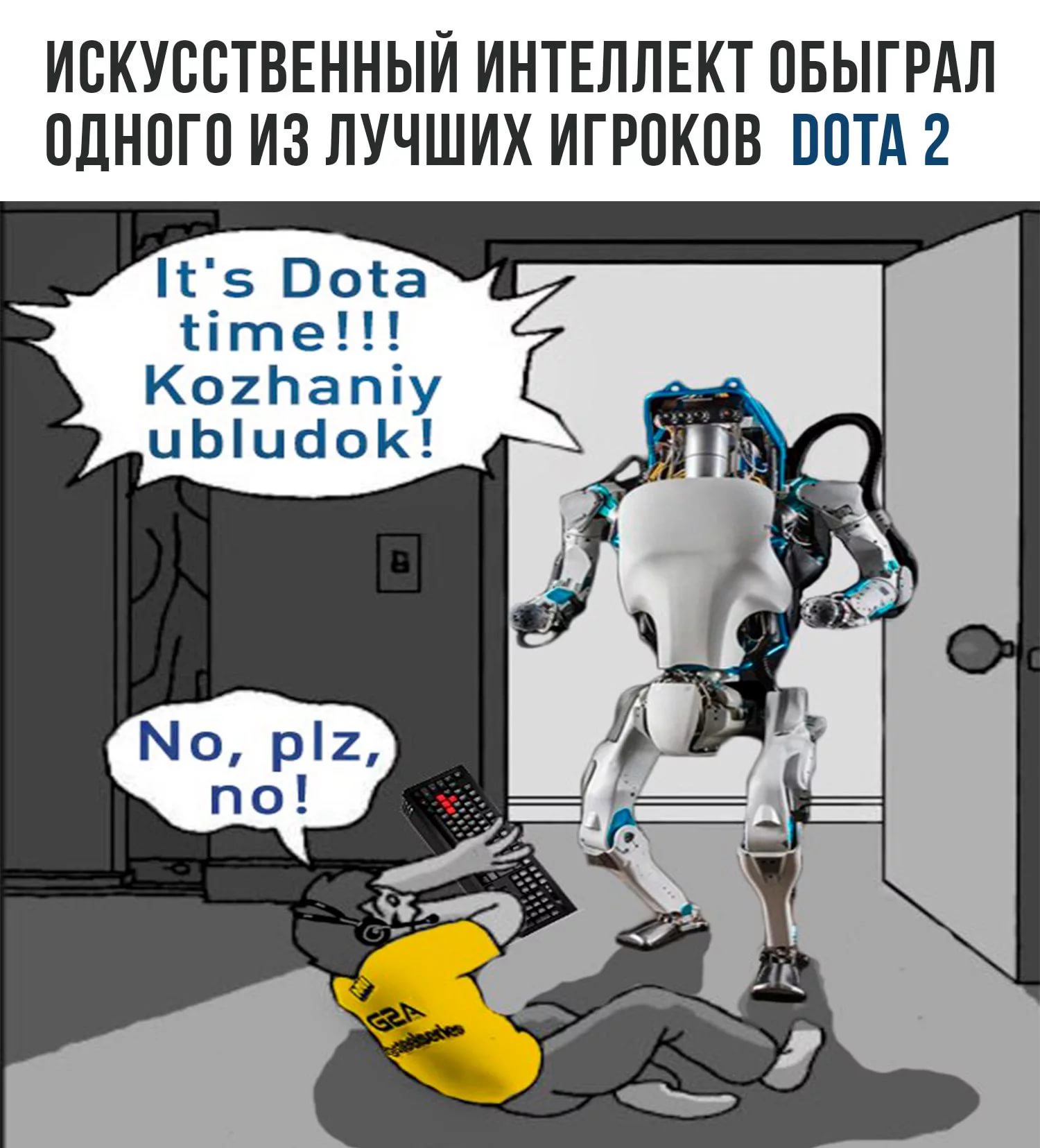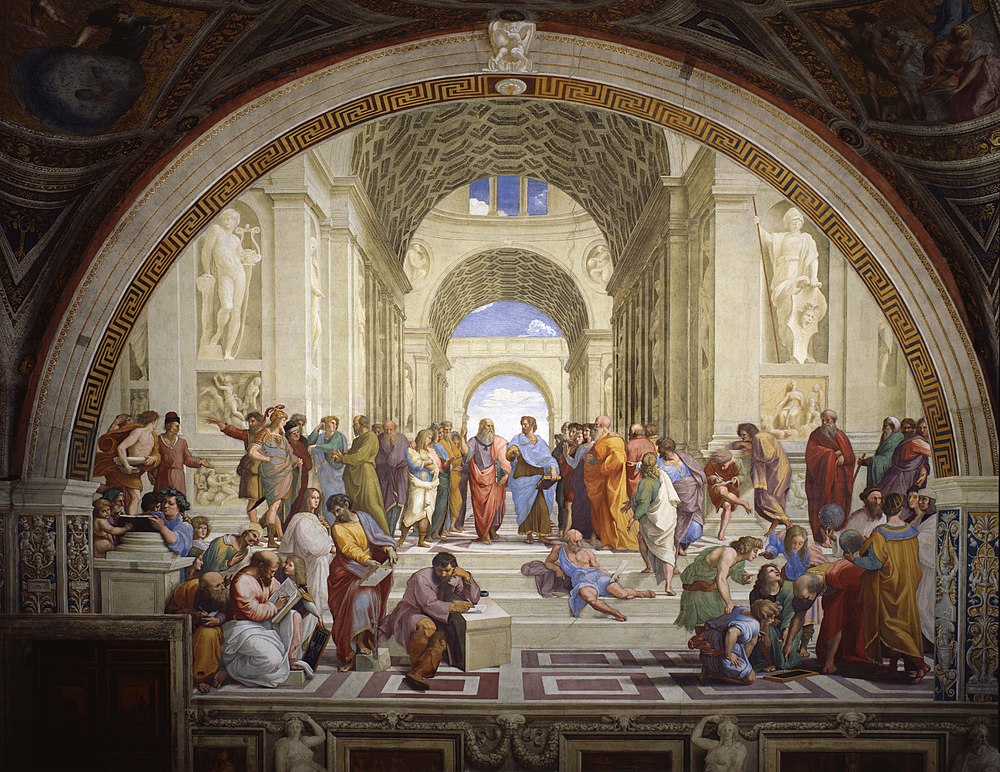Why are we afraid of robots?
If for some people the future with AI seems like a grim dystopia or struggle for survival, perhaps they should sort out their ideas about the nature of power and submission.
So says Stephen Cave, a senior researcher at the Leverhulm Center for the Study of Future Intelligence at the University of Cambridge. In his essay, he suggests exploring the history of intellectual superiority - and abandoning this false concept.

The progressive world of the second half of the 20th century was dominated by the fascination with the concept of artificial intelligence.
They thought about mental abilities, discussed them, and developed new approaches to measuring them. Tens of thousands of teenagers and job seekers in leading European countries have passed (and are) taking an IQ test.
This understanding runs through the whole history of Western thought, from the philosophy of Plato to the beliefs of modern politicians.
Throughout history, the Western world has determined in terms of intelligence what a person can do for society. For example, we traditionally (for the majority of the population) attribute a high level of mental abilities to doctors, engineers, and topofficials of the country .
Our attitude towards intelligence began to change rapidly with the development of artificial intelligence technologies. In recent decades, we have seen significant progress in this area and seem to be on the verge of tremendous scientific breakthroughs. Judging by the number of memeplexes and jokes on the topic of artificial intelligence, we are simultaneously delighted with what is happening and at the same time pretty scared. And in order to understand what exactly scares us so much and why we are so indifferent to the subject of mental abilities, it is necessary to consider it from a historical and political point of view and to trace how philosophical thought turned intelligence into a tool to justify endless conquests.

Plato made the mind a necessity for those in power
. Plato began to reason first about thinking. In his writings, he ascribes particular value to the process of reflection, arguing that meaningless life is not worth a penny. It is worth remembering that Plato lived in a world where myth and mystical consciousness constituted a natural environment for the human mind. Therefore, his statement that one can know the world through thinking was extremely bold and attractive at that time.
The idea at that time was revolutionary: yes, Athens had already experimented with democracy as a form of government. But the requirements for the rulers were very vague: it was enough to be a male citizen - there was no question of the level of mental abilities. And in other regions, government seats were distributed either by membership in the elite (aristocracy), or by appointment by divine providence (theocracy), or simply by level of strength (tyranny).

The fresco "The School of Athens", where Leonardo and Bramante are depicted along with Pythagoras and Aristotle.
The innovative idea of Plato successfully landed on the fertile soil of the great minds of the era, and his disciple Aristotle was no exception. He differed from the teacher in a more practical and systematic view of the world, so he used the “rational element of the soul” to create the concept of a natural social hierarchy. In his Politics, he states:
Based on this, educated men quite naturally dominate women, men of physical labor and slaves. Below in this hierarchy are only animals that are so devoid of reason that they simply need someone to control them.
We did not even notice how we moved from the Platonic idea of the primacy of the rational element to the Aristotelian concept, which presupposes the completely natural power of thinking men.
This train of intellectual injustice still runs on fuel, which it was fueled by two bearded men 2000 years ago. The modern Australian philosopher Val Plumwood argues that the two giants of Greek philosophy, armed with a series of dubious dualisms, still manage to influence our ideas about the mind.
For the fact that we perceive the dominance relations by the right of the most intelligent as completely natural, we should thank Aristotle.

Western philosophy reached its peak with the works of the great dualist Rene Descartes.
If Aristotle recognized the animals at least some right to minimal and primitive, but still mental activity, then Descartes denied them this right completely. Consciousness, he believed, is the exclusive advantage of man.
Descartes' philosophy reflected the millennium of Christian ideology: it gave the mind ownership of the soul, a divine spark, inherited only to those lucky ones who were created in the image and likeness of God.

The idea that the mind defines a person has passed through the Enlightenment. Immanuel Kant - perhaps the most influential philosopher of morality from ancient times - believed that moral will is peculiar only to thinking beings: "persons" and "things in themselves." Non-thinking creatures, in his opinion, have "only relative value as means and are therefore called things." With them you can do what we please.
According to Kant, a rational being has dignity, and an unreasonable, non-thinking creature is incapable of it.
Such inferences subsequently became the cornerstone of colonial policy.
The logic is this: not white people are less intelligent; they cannot independently control themselves and their territories. And this is not only a justified step, but also the moral duty of any white person - to enter their country and destroy their culture.
The same logical construction worked perfectly for women who were considered too frivolous and fragile to share the privileges of a rational person.
Francis Galton is the father of psychometrics, pseudoscience in the measurement of the mind, and cousin of Charles Darwin. Inspired in his day by the Origin of Species, Galton created the concept that mental abilities are inherited and can be improved by selection.

Let us return to the question posed at the beginning of the article: why is the possibility of the appearance of artificial intelligence scaring us? Is it because we are used to the fact that the smarter always dominates, and we definitely do not want to be on the other side of the barricades?
Writers and directors have long been speculating on the theme of the uprising of machines.
For us, this is for white European men. Billions of other people have gone through centuries of submission, and many continue to fight the aggressors to this day, so for them the threat of enslavement by artificial intelligence remains a fantastic story.
White European men are so used to being at the top by right of ownership that the appearance of a possible rival in us responds with chthonic (irrational) horror.
I do not claim that fears of the emergence of strong artificial intelligence are groundless. There are real threats, but they have nothing to do with the colonization of human civilization by robots.
If artificial intelligence can ever harm us, it will almost certainly happen not because of the desire of AI to conquer humanity, but because of our own stupidity, which will miss a mistake. It’s not artificial intelligence that is afraid, but natural stupidity.
If society were convinced that the wisest person - not the one who has gained power, but the one who seeks to resolve conflicts - would we be more afraid of smart robots than ourselves?

So says Stephen Cave, a senior researcher at the Leverhulm Center for the Study of Future Intelligence at the University of Cambridge. In his essay, he suggests exploring the history of intellectual superiority - and abandoning this false concept.

The progressive world of the second half of the 20th century was dominated by the fascination with the concept of artificial intelligence.
They thought about mental abilities, discussed them, and developed new approaches to measuring them. Tens of thousands of teenagers and job seekers in leading European countries have passed (and are) taking an IQ test.
Even then, the very idea that intelligence can be measured as blood pressure or foot size was not new. But even older is our idea that the level of intelligence can determine a person’s position in life.
This understanding runs through the whole history of Western thought, from the philosophy of Plato to the beliefs of modern politicians.
Intelligence is Political
Throughout history, the Western world has determined in terms of intelligence what a person can do for society. For example, we traditionally (for the majority of the population) attribute a high level of mental abilities to doctors, engineers, and top
We believed that the level of intelligence gives us the right to control the fate of other people: we colonized, enslaved, deprived our genitals and destroyed those whom we considered less intelligent and developed.
Our attitude towards intelligence began to change rapidly with the development of artificial intelligence technologies. In recent decades, we have seen significant progress in this area and seem to be on the verge of tremendous scientific breakthroughs. Judging by the number of memeplexes and jokes on the topic of artificial intelligence, we are simultaneously delighted with what is happening and at the same time pretty scared. And in order to understand what exactly scares us so much and why we are so indifferent to the subject of mental abilities, it is necessary to consider it from a historical and political point of view and to trace how philosophical thought turned intelligence into a tool to justify endless conquests.

The historical thread of the stereotype
Plato made the mind a necessity for those in power
. Plato began to reason first about thinking. In his writings, he ascribes particular value to the process of reflection, arguing that meaningless life is not worth a penny. It is worth remembering that Plato lived in a world where myth and mystical consciousness constituted a natural environment for the human mind. Therefore, his statement that one can know the world through thinking was extremely bold and attractive at that time.
In announcing in his work “The State” that only a philosopher can rule the state, since only he can come to the correct understanding of things, Plato gave birth to the idea of intellectual meritocracy - the idea that only the smartest can control other people.
The idea at that time was revolutionary: yes, Athens had already experimented with democracy as a form of government. But the requirements for the rulers were very vague: it was enough to be a male citizen - there was no question of the level of mental abilities. And in other regions, government seats were distributed either by membership in the elite (aristocracy), or by appointment by divine providence (theocracy), or simply by level of strength (tyranny).

The fresco "The School of Athens", where Leonardo and Bramante are depicted along with Pythagoras and Aristotle.
Aristotle came up with the power of men
The innovative idea of Plato successfully landed on the fertile soil of the great minds of the era, and his disciple Aristotle was no exception. He differed from the teacher in a more practical and systematic view of the world, so he used the “rational element of the soul” to create the concept of a natural social hierarchy. In his Politics, he states:
“After all, dominion and submission are not only necessary, but also useful, and right from birth, some creatures differ [in the sense that some of them are supposed to be] for submission, others for domination.
Based on this, educated men quite naturally dominate women, men of physical labor and slaves. Below in this hierarchy are only animals that are so devoid of reason that they simply need someone to control them.
We did not even notice how we moved from the Platonic idea of the primacy of the rational element to the Aristotelian concept, which presupposes the completely natural power of thinking men.
This train of intellectual injustice still runs on fuel, which it was fueled by two bearded men 2000 years ago. The modern Australian philosopher Val Plumwood argues that the two giants of Greek philosophy, armed with a series of dubious dualisms, still manage to influence our ideas about the mind.
For the fact that we perceive the dominance relations by the right of the most intelligent as completely natural, we should thank Aristotle.

Descartes laid the moral foundation for the destruction of the planet
Western philosophy reached its peak with the works of the great dualist Rene Descartes.
If Aristotle recognized the animals at least some right to minimal and primitive, but still mental activity, then Descartes denied them this right completely. Consciousness, he believed, is the exclusive advantage of man.
Descartes' philosophy reflected the millennium of Christian ideology: it gave the mind ownership of the soul, a divine spark, inherited only to those lucky ones who were created in the image and likeness of God.

Kant justified colonial policy
The idea that the mind defines a person has passed through the Enlightenment. Immanuel Kant - perhaps the most influential philosopher of morality from ancient times - believed that moral will is peculiar only to thinking beings: "persons" and "things in themselves." Non-thinking creatures, in his opinion, have "only relative value as means and are therefore called things." With them you can do what we please.
According to Kant, a rational being has dignity, and an unreasonable, non-thinking creature is incapable of it.
Such inferences subsequently became the cornerstone of colonial policy.
The logic is this: not white people are less intelligent; they cannot independently control themselves and their territories. And this is not only a justified step, but also the moral duty of any white person - to enter their country and destroy their culture.
The same logical construction worked perfectly for women who were considered too frivolous and fragile to share the privileges of a rational person.
Francis Galton is the father of psychometrics, pseudoscience in the measurement of the mind, and cousin of Charles Darwin. Inspired in his day by the Origin of Species, Galton created the concept that mental abilities are inherited and can be improved by selection.
Galton was not limited to theoretical calculations: in the following decades, more than 20,000 women in California alone were sterilized after receiving poor results from the Galton tests

So why are we afraid of smart robots?
Let us return to the question posed at the beginning of the article: why is the possibility of the appearance of artificial intelligence scaring us? Is it because we are used to the fact that the smarter always dominates, and we definitely do not want to be on the other side of the barricades?
Writers and directors have long been speculating on the theme of the uprising of machines.
If it is natural for us to think that the smartest skins are removed and that one more developed nation can colonize another, then we are quite naturally afraid of the potential enslavement by ultra-smart machines. Artificial intelligence poses an existential threat to us .
For us, this is for white European men. Billions of other people have gone through centuries of submission, and many continue to fight the aggressors to this day, so for them the threat of enslavement by artificial intelligence remains a fantastic story.
White European men are so used to being at the top by right of ownership that the appearance of a possible rival in us responds with chthonic (irrational) horror.
I do not claim that fears of the emergence of strong artificial intelligence are groundless. There are real threats, but they have nothing to do with the colonization of human civilization by robots.
Instead of thinking about what we should do with artificial intelligence, it’s better to think about what we do with ourselves.
If artificial intelligence can ever harm us, it will almost certainly happen not because of the desire of AI to conquer humanity, but because of our own stupidity, which will miss a mistake. It’s not artificial intelligence that is afraid, but natural stupidity.
If society were convinced that the wisest person - not the one who has gained power, but the one who seeks to resolve conflicts - would we be more afraid of smart robots than ourselves?

Only registered users can participate in the survey. Please come in.
What is the future for AI and humans?
- 7.1% AI will form its “philosophy”, in which humanity is a threat to it 11
- 27.9% AI evolves and begins to develop its technology, breaking away from humanity 43
- 33.1% AI will develop in symbiosis and increase the achievements of mankind 51
- 25.3% AI is a pipe dream of researchers 39
- 5.1% Difficult to answer 8
- 1.2% I will indicate my option in the comments 2
